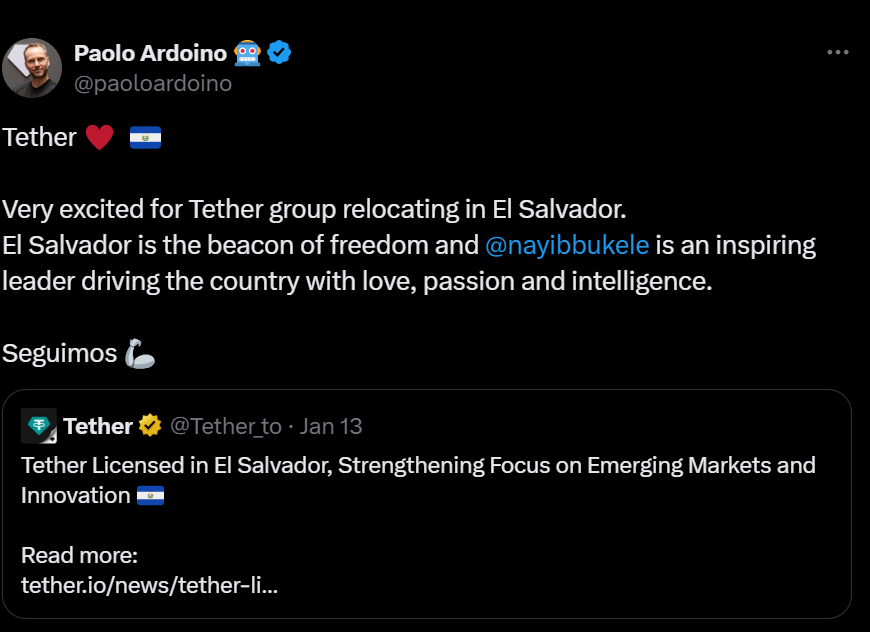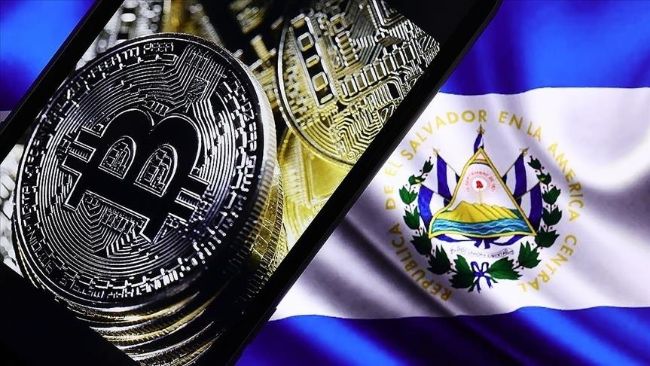El Salvador is launching the world's first Bitcoin-only bank for institutional investors and wealthy individuals.
The state has enacted an Investment Banking Act, allowing banks to retain Bitcoin and provide relevant services to accredited investors.
The Bitcoin Bank provides services such as loans distributed to Bitcoin, asset management, and digital wealth advisory services to institutional clients.
El Salvador is set to open the world's first Bitcoin-only bank. This can exceed all the nation's expectations in the struggle to evolve the country and adapt its financial system to cryptocurrency. The country that created international news, which became the first country to use Bitcoin as fiat currency in 2021, is now at the heart of digital assets innovation.
This is an initiative published by the official Bitcoin office in El Salvador through social media, which has led to a rise in the financial world. Although no opening dates have been set yet, the intent to create a bank that uses Bitcoin only significantly implies a change in the country's attitude towards cryptocurrency.
The introduction of Bitcoin Bank comes after a major update in El Salvador's regulatory approach to digital assets. At the heart of this transformation is the new law, with the Investment Banking Act being enacted. This regulation allows investment banks to own Bitcoin and other digital assets. This is a new step that breaks the old financial order. These banks can provide services such as trading, custody, and creating digital assets.
Another development within the law is the concept of a “digital asset service provider” (PSAD) license that allows banks to legally work with only Bitcoin and other cryptocurrencies. The qualification requires that the institution capitalize over $50 million. This is an act that will help guide foreign investors and turn El Salvador into a digital service center. With these established regulations, El Salvador welcomes foreign and registered investors to carry out banking activities related to Bitcoin, the new horizon of wealth management in the cryptocurrency sector.

Source: x
The main meaning based on the law is the difference between investment banks and commercial banks. Investment banks can specifically deal with Bitcoin without the traditional restrictions that bound commercial banking activities. This difference could reduce regulatory pressures that traditional banks face, but at the same time help develop Bitcoin-related financial services.
The law also stipulates that investment banks must only trade with accredited investors who have a minimum net worth of $250,000. This eliminates the risk of using Bitcoin as a volatile medium and provides for the focus of Bitcoin banking initiatives on wealthy individuals and institutional investors. In contrast to retail banking, the shift to targeting the institutional market for TH0E could potentially draw more investment into the country's Bitcoin infrastructure.
El Salvador's Bitcoin Journey
The road to El Salvador and Bitcoin was not easy. Other moments in history came when President Naive Bukere signed the Bitcoin Act in 2021, when he explicitly recognized Bitcoin as a domestic fiat currency. This was the first of its kind, and was done to create financial inclusion that allowed millions of banks to access digital financial services. However, the verdict received mixed sentiment both locally and overseas. Bitcoin supporters were pleased with such a bold step, but many Salvadorans were particularly unhappy with the volatility of Bitcoin and the possibility of implementing regular purchases.
International financial communities such as the International Monetary Fund (IMF) had expressed concern over the impact of Bitcoin adoption on the country's economic stability. Critics argue that the move puts the country's economic sovereignty at risk, and its sensitivity to its economic volatility. These concerns have led El Salvador to engage in several revisions to its Bitcoin policy. At the beginning of 2025, the country revised its Bitcoin Act, so it is no longer necessary for businesses to accept Bitcoin. The government has also stopped requesting Bitcoin as a form of tax payment, so it can be used as a way to invest money, but not as a currency to use.
With these changes in regulations, the government continues to stock up on Bitcoin, and to date, the country's Bitcoin reserves have stood at around 6,246 Bitcoins by mid-2025. The list of Bitcoin-only banks is considered the next stage in the evolution of this process as changes to the provisions of retail-based adoption for institutional investments occur.
In addition to financial products related to Bitcoin, banks may offer advisory services specialized for institutions that wish to venture into the world of cryptocurrency. This includes helping clients learn to generate investment plans specifically designed for regulatory requirements, Bitcoin storage, and digital asset economy. By offering a complete package of Bitcoin-related services, banks will establish a Bitcoin ecosystem where there is an opportunity to invest in Bitcoin in a more organized and secure way.
A step towards institutional adoption of Bitcoin
The establishment of a Bitcoin-only bank in El Salvador is a major milestone in the broad set of institutional adoption of both Bitcoin and other digital assets. In recent years, there has been a significant invasion into the cryptocurrency market by large financial players, including JPMorgan, Goldman Sachs and Fidelity, due to the provision of Bitcoin services or the addition of digital assets to the balance sheet. Nevertheless, it is not yet to the extent that the banking system fully adopts the use of Bitcoin, as is currently being done in El Salvador.
This decision can be seen as a trend that is taking place all over the world as countries and organizations working in the financial sector are beginning to actively regulate cryptocurrencies and find ways to implement them in the global financial system. El Salvador's move to introduce a single bank to trade in Bitcoin provides examples for other countries looking at ways to approach digital resources. By placing regulatory systems in sequence and securing what institutional investors need to start investing in Bitcoin, El Salvador has secured its position as a pioneer in the development of cryptocurrency finance.
Opening a Bitcoin Bank is a great attempt to move forward, but there are no risks. The state is making great strides to integrate Bitcoin into the financial system. However, this policy is carried out during review by both domestic and foreign stakeholders as the assets are very unstable. Price volatility will red flag potential investors, and the whole financial world may not yet be ready to adopt Bitcoin as a stable medium for banking services.
The amateur moves El Salvador adopted to run banks that only cooperate with Bitcoin, especially as countries around the world continue to experiment with cryptocurrency strategies.
Another issue is the ongoing case of cybersecurity. Because Bitcoin is a digital asset, banks must always spend a lot of money on implementing cybersecurity systems, ensuring that their clients' funds are safe against hacking and fraud. This depends not only on high-level technical capabilities, but also on the organizational infrastructure to protect bank assets and clients against the potential threat posed by cybercrime.

